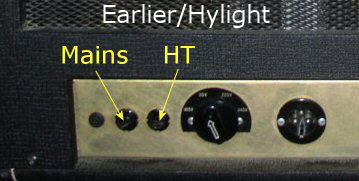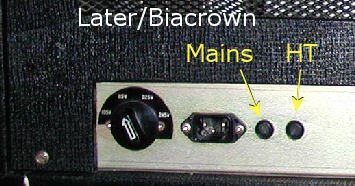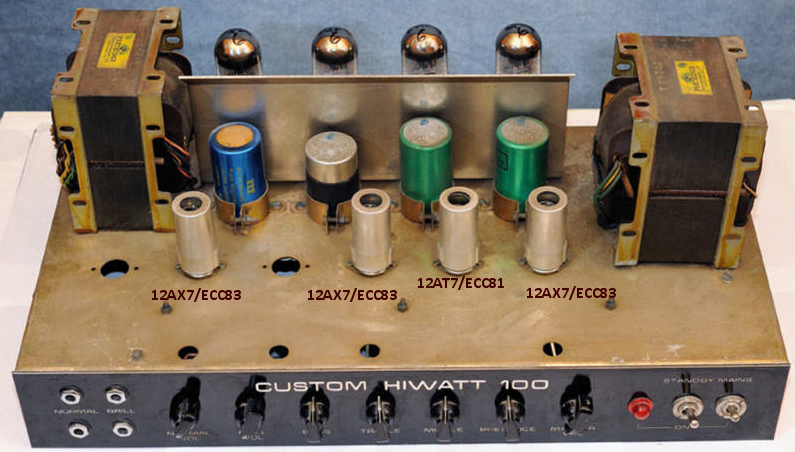
Technical Information
Last updated November 5, 2022Note: The layouts and schematics have been been moved to their own page.
Hiwatt Fuse Locations and Values
|
Note that fuse values are not an exact science. For example, a 5 or 6.3A fuse will do in place of the "6A" specified, and a 3.15 will do in place of the "3A" specified. All of the values below are normal "fast" fuses unless otherwise indicated, and were taken from a circa 1978 Hiwatt catalog. | |||||||||||||||||||||
| |||||||||||||||||||||
 |
 |
||||||||||||||||||||
Preamp Tube/Valve Locations
Later amps used 12AX7/ECC83 in all locations, but this is the "classic" configuration for all DR504, DR103 and DR201 amps:

Tech Trivia
A thorough analysis of the unique Hiwatt fixed-bias PI by Richard Kuehnel.
Telltale bulges that indicate your filter caps need replacing.
Improved bias circuits for the original 50 and 100 watt amps.
A quick-and-dirty way to add a bias adjustment to a DR504 or DR103. NOTE: This will not help much, if at all, on a DR103 with the old original Partridges, because these do NOT have enough bias voltage for this to work well.
User-contributed layouts of the DR103 voltage doubler mod using either one or two control pots. (H/T René M.)
Another user-contributed layout of the DR103 voltage doubler mod. (H/T Chris B.)
A page describing the (in)famous Canadian mod, and how to restore one of these amps to stock.
A page describing a mod to reduce the "spitty" blocking distortion on the standard two-input amps.
A page describing the input voltage selector.
A speaker cabinet layout diagram.
Chassis Screws:
The original Hylight machine screws were British Imperial #2 (2BA) thread, and these can be hard to find, particularly outside of the U.K.
The US 10-32 thread size is close, as is the metric size M5 x .08. In either of these latter cases, I'd recommend getting a tap of the appropriate size and running it through the chassis nuts so the that the replacement screws do not bind. The tap barely touches the threads, so it's very easy to do.
My Biacrown DR504 screws are 1 inch 10-32 Phillips heads with 3/4 inch washers.
DR103 Specifications (Audio Brothers)
| Input Line Voltages | 100v, 117.5v, 225v, 250v AC | ||
| Power consumption | 330 watts maximum | ||
| Fuse Ratings | Mains | (100 or 117.5v) | 6.3A (T) slow blow |
| (225 or 250v) | 3.15A (T) slow blow | ||
| H. T. | (all) | 3.15A (T) slow blow | |
| Output Valves | 4 matched EL34 (6CA7) | ||
| Preamp Valves V1, V2, V3 | ECC83 (12AX7)(7025) | ||
| Preamp Valve V4 | ECC81 (12AT7)(6201) | ||
| Output Power | 100w RMS (min) into 8Ω | ||
| Loudspeaker Impedance | 4Ω, 8Ω, or 16Ω | ||
| Dimensions | W: 640mm (25.2"), D: 288mm (11.3"), H: 269mm (10.6") | ||
| Weight | 20.5kg (45 pounds) | ||
The DR103 Partridge Output Transformer
This is a wide bandwidth "hi fi" transformer, much more so than the normal guitar amp output transformers in wide use.
| Primary Impedance (Raa) | 1750Ω |
| Frequency Response (-3db) | 3.6 hz - 112 khz (!) |
| Weight | 3.2kg (7 pounds) |
Heyboer Transformers in Michigan, USA, is now making Hiwatt-style OTs, using high-grade lams and winding patterns like the original.
Hammond is now making output transformers with normal 0-4-8-16 secondaries! Their model 1650TA is good for a 100 watt and 1650KA for a 50 watt.
Another possibility for new builds (not a drop-in replacement) is a generic Marshall replacement transformer like the New Sensor MOP-100.
The DR103 Partridge Power Transformer
For a DR103, the power transformer is less critical, and any quality unit which provides the following will work fine:
- 350 VAC @ 300mA (HT)
- 6.3 VAC CT @ 7.5A (Heaters)
- 50 VAC @ 50mA (Bias)
Unfortunately, the HT winding is an unusual voltage value, meant for a full wave bridge, and separate bias windings are also rare (as opposed to a Fender-style bias tap off the main HT secondary).
Heyboer Transformers in Michigan, USA, is now making Hiwatt-style PTs which have the same set of secondary windings as the original, but with an improved (higher) bias voltage winding. Again, VHR is a good retail outlet for these.
Note that this is currently available in either single 120v primary or dual 120v (switchable 120 to 240 volt only), and is therefore not a drop-in replacement. VHR & Heyboer are currently developing a drop-in replacement.
Another possibility is to use a JMP100 Marshall 100 watt replacement like the Hammond 290HX. NOTE: If you choose this option do NOT ground the secondary center tap, but rather tape and stow it unconnected. These specific Marshall replacement transformers are designed to be used with the Marshall "voltage doubler" power supply, and so the voltages also work out for a DR103. You will need also to adjust the bias supply resistor, as the bias supply on these is twice the stock Hiwatt value.
- 356 VAC @ 420mA (HT)
- 6.3 VAC CT @ 7A (Heaters)
- 100 VAC @ 50mA (bias)
For a 50 watt, a generic Marshall 50watt replacement transformer such as the Hammond 290GX will work fine:
- 300-0-300 VAC @ 250mA (HT)
- 6.3 VAC CT @ 5A (Heaters)
The DR201 Partridge Output Transformer
Hiwatt friend David Shiers has provided the following measurements of a 1971 TG7239 output transformer:
4 Ohm Tap
- Voltage/Turns ratio 23.75:1
- Impedance ratio 23.75^2 = 564
- Primary Impedance = 4(Ohm) * 564 = 2256 Ohms
8 Ohm Tap
- Voltage/Turns ratio 16.5:1
- Impedance ratio 16.5^2 = 272.5
- Primary Impedance = 8(Ohm) * 272.5 = 2178 Ohms
16 Ohm Tap
- Voltage/Turns ratio 11.95:1
- Impedance ratio 11.95^2 = 142.8
- Primary Impedance = 16(Ohm) * 142.8 = 2285 Ohms
This appears to have a 2250 Ohm primary impedance (reflected).
The primary DC resistance is ~36 Ohms
Main Hiwatt Page